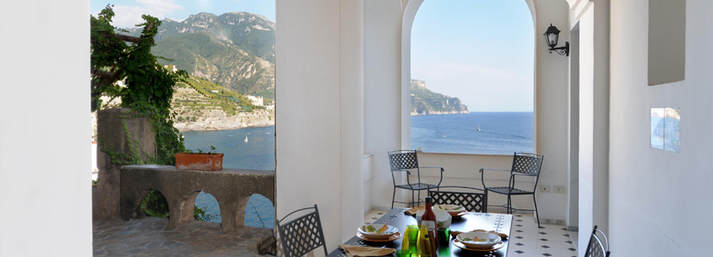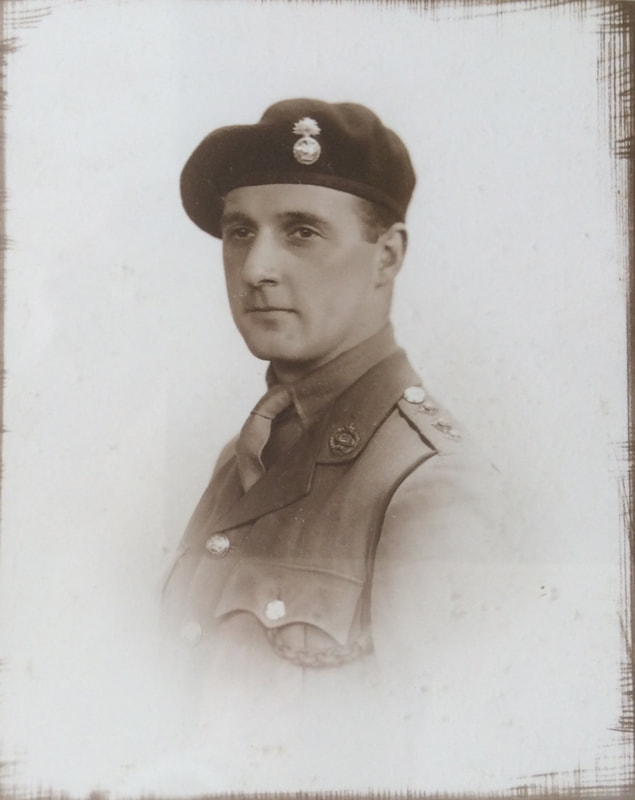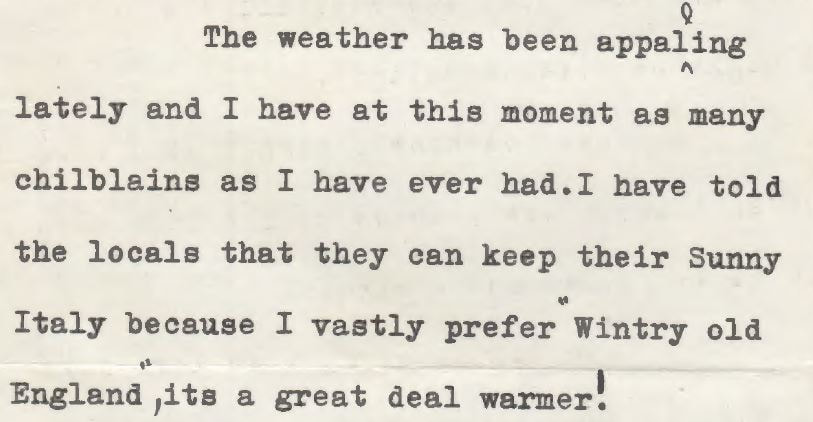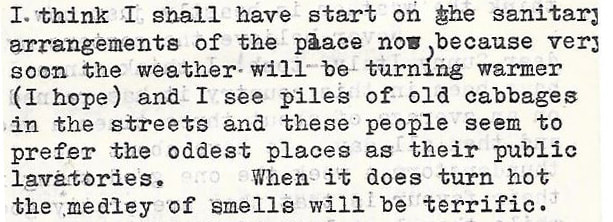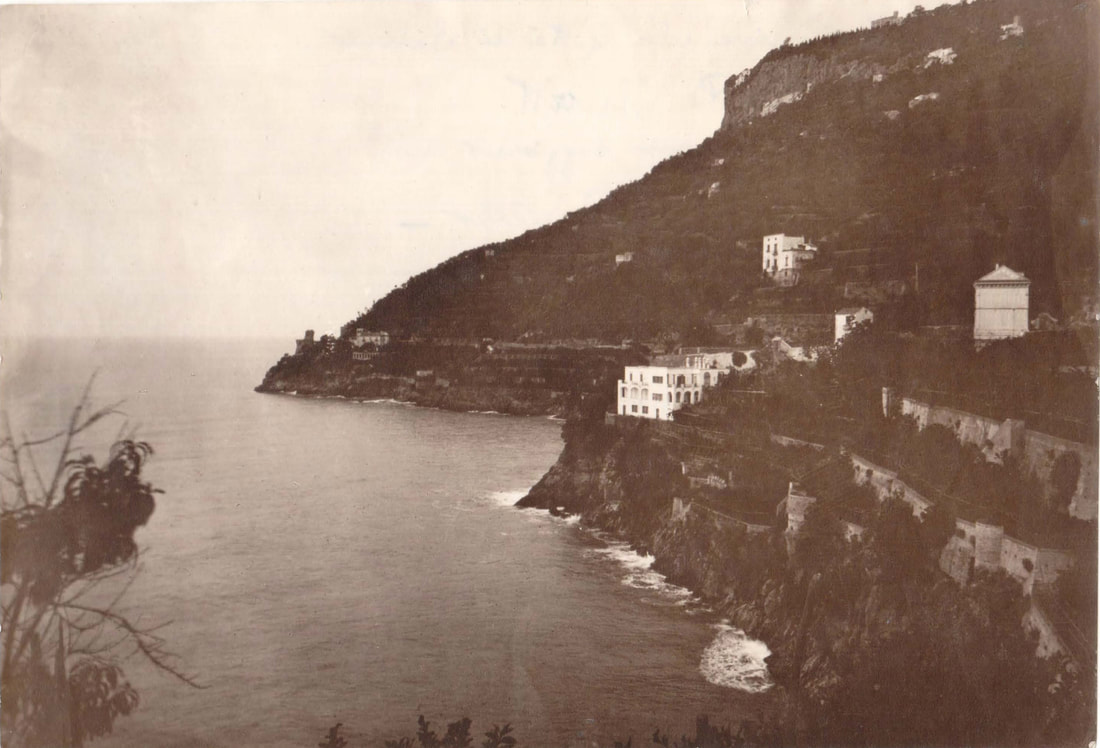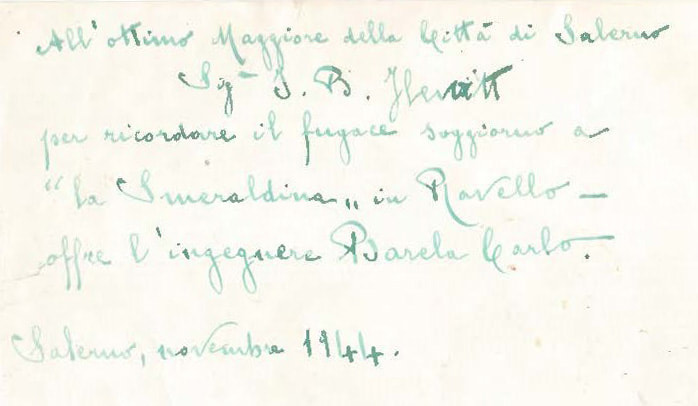|
It was whilst thinking I really need a holiday and realising that September has evaporated without me taking my hoped for break, that I realised I was craving somewhat warmer climes and sunshine. My thoughts drifted to Salerno on the Amalfi Coast of Italy, and someone else who needed a holiday in September 1944! As it happens the villa ‘borrowed from the man who own[ed] it’ is still available to rent for holidays today – La Smeraldina in Ravello. The holiday turned out to be a mere four days, and even they did not go according to plan! However, the issues that arose were not War related, but rather of a haphazard domestic nature. Stephen Burgess Hewitt was Town Major of Salerno at the time, and was made an Honorary Citizen on 17th March 1944 in recognition of the work he carried out which helped to ‘alleviate the pain and to hasten the return of the life of the town to the normality of its pace’. Although the language used is of a ‘time’ his letters home talk of the lighter moments he experienced as well as his official duties. When combined, the information the letters contain sheds some light on civilian life at the time and are a useful and sometimes amusing social history resource. More potent perhaps as the experiences are his own and not an interpretation or account of events around him. Stephen’s journey to Salerno began in September 1940 when as a Captain of 27 years of age he was sent with the Royal Tank Regiment to join the 7th Armoured Division the ‘Desert Rats’ in Egypt. He served in Abyssinia from August to September 1941 and was ‘mentioned in Despatches that December. He then served with the Eighth Army in North Africa until transferred to Italy in 1943. A photograph in the family’s possession with Winston Churchill and Field Marshall Montgomery suggests he was also present at the victory march in Tripoli on the 4th February 1943. He was promoted to Town Major in April 1943 and a letter dated 26th July contains the first rather ambiguous hints that a change is 'a foot'. I am awaiting my job it may turn up any time but as the Brig has put me in for something else I may change it quite soon. He says that if I get it I shall be paid about three times my present rate. But as I told Mother, I am not counting any chicks yet! Interestingly, in the same letter a paragraph later, he recounts hearing of the resignation of Mussolini. I have just heard that Musso has resigned for (the German radio tells us) health reasons. Presumably he has had ill health thrust upon him! This sentence provides evidence that the knowledge of Mussolini’s resignation was known, at least by some, just the day after it happened. It also holds clues as to his sense of humour! Monty, the Eighth Army, which included the 7th Armoured Division arrived in Salerno on the 15th September 1943, some 6 days after the amphibious Operation Avalanche launched the allied invasion of mainland Italy on the 9th. It is unclear if Stephen was with them, or if he had been sent ahead as other written evidence suggests his having arrived on the 8th. This may account for the ‘remember you are now “so and so” and you come with us’, again written in the July letter. The war diary of Harry Blood tells of his own arrival at Salerno with ‘B’ Advance Stationery Depot. They arrived in Salerno on the 26th where ‘… a lot of activity this afternoon – too much for comfort!’ was recorded by Harry, and amusingly that: ‘On arrival our Captain went to the Town Major to report that 862 Advanced Stationery Depot had arrived. He said to the Captain, ‘Paper is the last thing we want at the moment’. The Captain’s comment was, ‘It’s OK, we haven’t got any!’ The next letter home from Stephen written on the 12th December gives an idea of his role: I am still very busy, no job is outside my scope, at the moment my area covers about eighty square miles, with many towns and villages. I am really responsible for housing all the troops in such places, in addition here, I have collected two clubs an Officers Leave and Transit Camp, Town Guard Room and a civilian housing committee which has had to house about 35,000 people. I have also managed to get started a civilian Transit Camp because it was quite common for me to have a family of twenty just come and squat in my Office at about nine o'clock at night, so that I organised that one to save myself some bother. In February 1944 we hear the he is still working ‘hammer and tongs’ having had no day off for four and a half months. He was also not taking kindly to the cold weather. He also describes his house, which sounds lovely and am only sad I have as yet been unable to discover where it was. The little house I am living in now would just about suit you and Dorothy, at the moment it suits me!, it has a kitchen a dining room, a sitting room, two large bedrooms, two small bedrooms, a servants room and usual things like a bathroom. It has also a great attraction for the kids, a small pool and fountain, the pool has two or three gold fish in it. The garden is very small and very suburban but quite pleasant and in spite of the cold at the moment there is quite a nice show of Mimosa. In March his attention has been turned to issues of sanitation with the anticipation of warmer weather, although there has recently been another fall of snow. In the next letter of April 1944 Stephen complains of getting fat and gives an amusing account of a run in with a nun. … However, I have taken great pains to listen to these people here and help where I can, I have also taken great pains to always to carry out a promise, even if I haven't promised a great deal since I have been here. I am glad to say that they appear to trust my office implicitly and are unfortunately inclined to credit me with the most extensive powers, such as being to release all their relations from prison, in fact there are so many peculiar ways they think I can operate, that I might appear to have the powers of the late lamented Musso. Most of their requirements are very closely linked with the individual making the requests. On the 25th September 1944 a year after his arrival Stephen is trying to enjoy the well-earned aforementioned break at the villa La Smeraldina. He writes to his brother: At the time of writing I am sitting in the little white and green villa right at the edge of the sea, some way above it but I am able to throw my cigarettes into it from my bedroom window. It has three bedrooms, a large lounge cum dining room, a kitchen, bath etc. but it is very new and clean, with the most modern things, all the lighting for example is concealed and it is fully furnished with wireless sets and so forth. The rooms are decorated and designed to look like a grotto and all beautifully clean. I have borrowed it from the man who owns it and for these four days I have imported my own staff, i.e. my batman, chef and maid of all work. His November letter to his sister contains further glimpses of his social life: Last night I went out to have dinner with the man who painted my portrait. He is the strangest little chap, quite young but so excitable and friendly. He seizes your hand between both of his and bows so low, that I sometimes think he will fall over. I then have to say ‘good evening’ to his wife, his two small children, the sister and a friend who rush at you and smile, as my Italian is still limited, most of the conversation consists in smiling fatuously at one another. The above is not intended to trivialise the Italian campaign which was particularly savage and heavy losses were sustained by both sides and civilians as described in this Italian article extract: The bombings before, the fighting then: the price paid to the war from Salerno and its province was very high: 400 dead, thousands injured. Material damage was enormous: 15,000 destroyed rooms, over 100 damaged bridges, one fifth of industrial buildings lost. Eating, housing and transporting points of greatest pain. The above is rather trying to focus on the impact of war on the civilian population and the role of the military in helping to repair at least some of the devastation it caused, together with snippets of human interest. This was also an interesting period in Italy’s own national history as between 11th February and August 1944 Salerno acted as the administrative Capital of Italy. The seats of the Badoglio Government in Salerno:
The city also played host to Victor Emmanuel III, the King of Italy and Salerno during this short period must have been a colourful and vibrant place, full of an eclectic mix of people. This is briefly described in the article Kingdom of the South translated from Italian - as is the Salernitans’ evident pride in this period of their history. The city of Salerno has played the role of Capital for only a little more than five months, yet in that short, but convulsive and dramatic time, it formed a government that was the cell, the first support of the new Italian state, the beginning of the history of our rebirth as a people, as democracy, as a government
0 Comments
|
AuthorSusie Douglas Archives
August 2022
Categories |
Copyright © 2013 Borders Ancestry
Borders Ancestry is registered with the Information Commissioner's Office No ZA226102 https://ico.org.uk. Read our Privacy Policy
